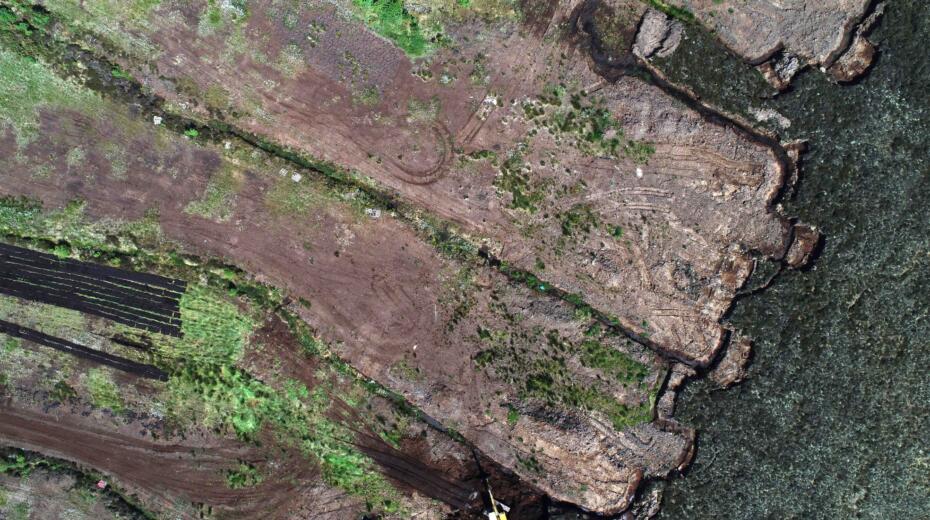
CeADAR explores AI solutions to protect Ireland’s peatlands
CeADAR, Ireland’s centre for applied artificial intelligence (AI), is exploring how AI can monitor and protect Ireland’s existing peatlands and boost biodiversity through peatland restoration.
The AI2Peat project is a collaboration between CeADAR, the National Parks and Wildlife Service (NPWS) and iCRAG – the Science Foundation Ireland Research Centre in Applied Geosciences. It is one of 26 teams taking part in a €65 million National Challenge Fund competition to investigate how emerging digital technologies can be used to help Ireland achieve its goal of becoming carbon neutral by 2050.
Led by Dr Oisín Boydell, director of applied research at CeADAR and Dr Eoghan Holohan of iCRAG, AI2Peat aims to address challenges around monitoring remote peatlands and estimating the carbon storage capacity of individual habitats.
The research team also plans to use data gathered by drones, satellites, and citizen scientists to develop an all-Ireland mapping solution to identify peatland areas under threat from erosion, exploitation, and climate change, and to identify areas of high conservation value.
Peatlands store vast amounts of carbon in their soil and aquatic plant life. Over decades, the process of draining peatlands for farming, afforestation and extracting fuel for industrial and domestic use has turned these areas from carbon sinks to carbon emitters.
Peatlands also play a vital role in maintaining the biodiversity level of the countryside and protecting nearby urban areas from flooding during heavy downpours. Upland peatlands are also important source catchments for the water supply to urban areas, such as Dublin city and the greater Dublin region.
Ireland’s peatlands cover around 17% of the land surface area of the country. Peatlands protection has long been a sensitive issue for many in rural Ireland who have a cultural connection to the land and rely on turf as a cheap source of fuel.
AI2Peat is now in the six-month concept stage of the National Challenge Fund project, in which organisers receive €50,000 in funding to explore the problem. This is to be followed by the seed phase in which teams will receive €150,000 to engage experts, local stakeholders, and communities on the ground to gauge the applicability of their proposed solutions.
In the final stage, 10 teams are selected from the group of 26 to further develop their projects and are awarded an additional €500,000. Following that, the best project is selected by a judging panel with the winner receiving further funding of €1 million.
“Peatlands are a very important natural ecosystem in Ireland,” said Dr Oisín Boydell, director of applied research at CeADAR. “The specific purpose of AI2Peat is to protect and monitor these habitats, but our goal is to influence policy around environmental protection, biodiversity, and climate change. Ultimately, we’re interested in assisting organisations like the National Parks and Wildlife Service (NPWS) who are struggling to protect these vast and remote spaces.
“We’ve pulled together a great team involving iCRAG, NPWS and ourselves. We’re lucky to count Dr Shane Regan, a senior scientist with the NPWS and a leading peatlands expert, as our societal impact champion. His knowledge of the fundamental ways in which peatlands work will be essential to the success of AI2Peat.
“A lot of data has been collected from drone surveys, satellites, earth observation and on-the-ground measurements supported by citizen scientists. Artificial intelligence technology can give us insights into the complex dynamics that are degrading our peatlands and represents an exciting new solution to the preservation of the environment for humans and animals alike.”
Dr Shane Regan, senior scientist at the National Parks and Wildlife Service, said: “The State has long had an enormous challenge in protecting its vast array of peatland habitats. The majority of these peatlands are in poor condition and are large sources of carbon emissions. Improvements in the ways we can remotely detect high quality areas for protection, and areas that can potentially be restored with intervention measures, will be enormously beneficial and help direct financial resources to areas where they are most needed.”
“iCRAG is about discovering new ways to manage our resources and our environment for a sustainable society,” said Dr Eoghan Holohan, associate professor at UCD School of Earth Sciences and iCRAG. “In partnership with CeADAR, NPWS, and the wider wetland community, we aim in AI2Peat to contribute to the development of innovative digital tools and techniques to better understand the status and dynamics of Irish peatlands. Ultimately, such innovations should advance Irish climate action and help to safeguard these national assets for future generations.”
TechCentral Reporters







Subscribers 0
Fans 0
Followers 0
Followers